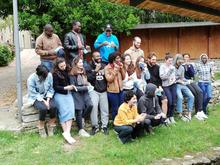- June 10, 2021
Can enemy groups learn to develop compassion for one another? That was the question Carter School professor Daniel Rothbart set out to answer in his research at Rondine, a two-year “laboratory for peace.” Now, the results are in.
“This is the first in-depth case study of compassion among civilians who live in conflict zones,” said Rothbart, who collaborated with George Mason University professors Thalia Goldstein, Marc Gopin and Karina Korostelina. “We hope this is a model that can help create new practices for peacebuilders to cultivate compassion.”

